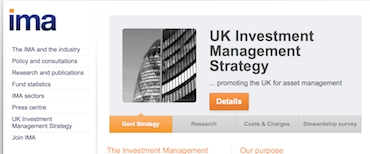The Investment Management Association fears some of the firms that may end up coughing up to fund the Government's new retirement guidance service will be ones that don't actually benefit from it.
The organisation has called on the FCA to ensure that the levy is only paid by companies, which are "actively participating in/benefiting from the retirement financial products market".
It is concerned that investment management firms may be sucked into the group of organisations that fund it, despite gaining nothing from the service, while workplace pension master trust arrangements, which will benefit, will escape contributions.
{desktop}{/desktop}{mobile}{/mobile}
In its response to the FCA consultation on the service, which ends today, the IMA said it was important "careful consideration" was given to how it is paid for.
The IMA's submission to the FCA read: "There may be some firms or entities within the existing fee blocks that won't be involved in the retirement financial products market and should therefore not have to bear the costs of the retirement guidance service.
"We have a concern – which the FCA also acknowledges – that they may capture some firms or entities that may not benefit from the retirement guidance service, for example investment managers that do not operate in the retirement financial products market at all.
"Such providers would be paying the retirement guidance levy without actually benefitting from it since their products would not be marketed as retirement financial products."
OPS firms - the in-house asset managers of large corporate pension schemes, typically Defined Benefit schemes – should be exempted, it argued.
It said: "OPS firms are not behaving as product providers in the retirement financial products market and they won't be competing for or receiving any external business – indeed they are not allowed to take on third-party customers.
"They will not benefit from the retirement guidance service and therefore there is no clear rationale for them to pay the retirement guidance levy."
It said some firms operating in the retirement financial products market that are not FCA-regulated entities will therefore not be liable for the retirement guidance levy, but may stand to benefit from the guidance service. It highlighted master trust pension schemes as one such group.
The IMA said: "We have a concern that there may be some entities that are not covered at all by the FCA fee blocks that may benefit from the retirement guidance service – in particular workplace pension master trust arrangements, which may be in a strong position to offer retirement financial products to their own members or attract new business on this basis from other DC arrangements."
It wants the Government to consider how trust-based pension schemes run on a commercial basis only can contribute to the levy.
It said: "This should ensure a fairer distribution of the costs. Since all trust-based pension schemes must register with the Pensions Regulator it should be possible to identify those who should make a contribution to the retirement guidance levy."

